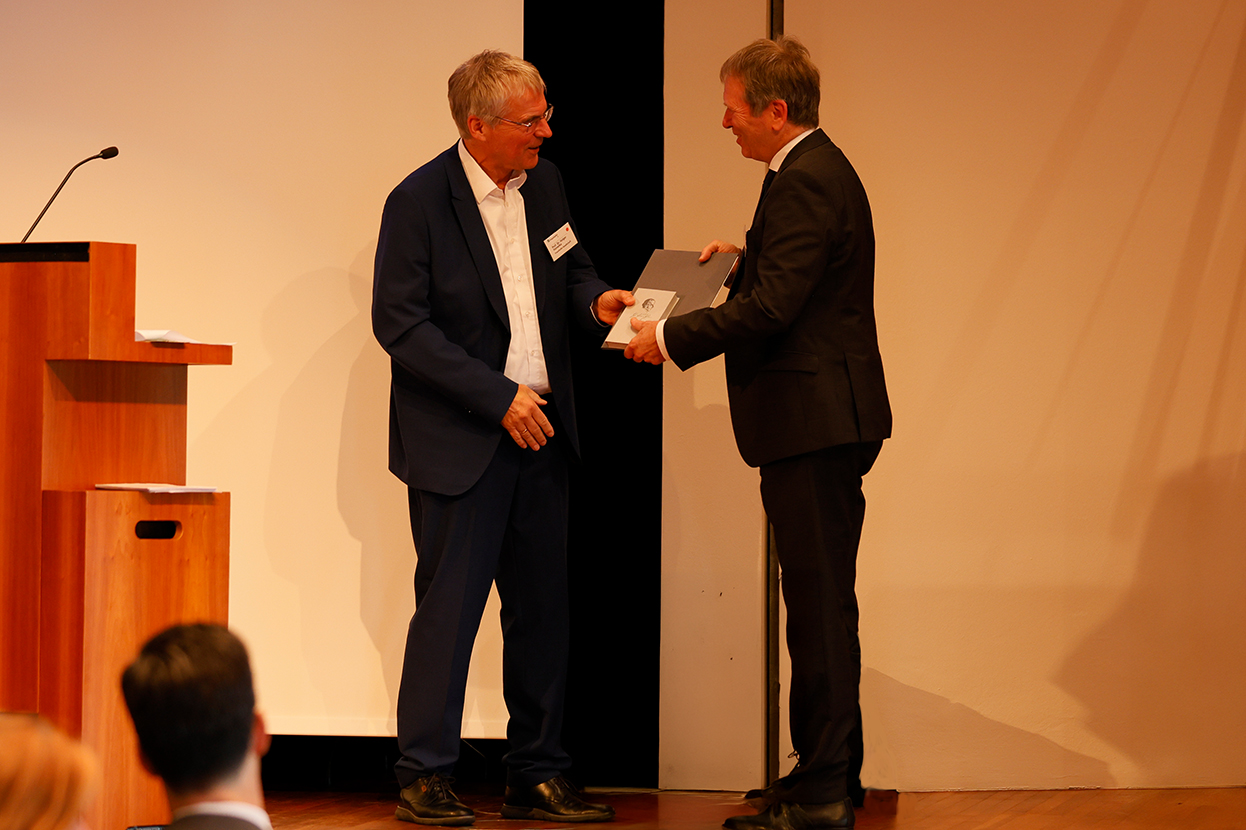Press Release #28
Hans-Martin Henning: Driving Force Behind Fraunhofer Energy Research Retires
Prof. Hans-Martin Henning was honored yesterday with a scientific symposium to mark his retirement. The director of the Fraunhofer Institute for Solar Energy Systems ISE in Freiburg also shaped the Fraunhofer Society's energy research for many years. As chairman of the Expert Council for Climate Issues, he advised the German government on the implementation of the Climate Protection Act from 2020 to 2025 and, in this role, was a vocal advocate for consistent measures.
Hans-Martin Henning shaped energy research at the Fraunhofer Society and beyond like few other scientists and institute directors. After obtaining his doctorate in physics at the University of Oldenburg in 1993, he joined the Fraunhofer Institute for Solar Energy Systems ISE in Freiburg in 1994. His research focused in particular on building energy technology and energy system analysis. In 2014, he took over the professorship for Technical Energy Systems at the Karlsruhe Institute of Technology KIT, and on January 1, 2017, he was appointed director of Fraunhofer ISE in addition to his professorship for Solar Energy Systems at the University of Freiburg. He headed the institute together with Prof. Andreas Bett, who will now continue to lead Fraunhofer ISE as sole director. Henning's tenure saw important developments at the institute, such as the significant expansion of research in the fields of battery technology, hydrogen technologies, and heat pumps.
A comprehensive approach to the energy transition
Hans-Martin Henning recognized early on that thinking in terms of individual technologies was not enough to ensure the success of the energy transition. His scientific work is characterized by a comprehensive view of the energy system and its transformation to achieve climate neutrality, taking into account all sectors and their interactions. He played a leading role in the development of computational tools for the simulation and optimization of complex energy systems, such as the REMod model for Germany. Through studies conducted with these tools, scientists gained important insights into the course, technical feasibility, and costs of the energy transition. Prof. Henning and his team continuously developed the model, taking social behavior into account as a key influencing factor. “The energy transition is not only technically possible, it also offers technological and thus economic opportunities. However, it will only succeed if it is supported by society,” he is convinced. The question of how successful the energy transition in Germany is proving to be and what role it plays in the technological sovereignty of Germany and Europe also dominated the scientific symposium held to mark its adoption. Decision-makers from the fields of research, politics, and business presented their respective perspectives and discussed new approaches and possible improvements.
Networker and advocate for climate protection
From 2017 to 2024, Hans-Martin Henning was spokesperson for the Fraunhofer Energy Alliance, which brings together the energy expertise of 20 Fraunhofer Institutes, making it one of the largest energy research platforms in Europe. As a member of the Presidium of the Fraunhofer Society and spokesperson for the Fraunhofer Group for Energy Technologies and Climate Protection, the Fraunhofer Cluster of Excellence for Integrated Energy Systems (CINES) and the Fraunhofer Strategic Research Field “Resource Efficiency and Climate Technologies,” he networked the rapidly growing energy research sector within the Fraunhofer-Gesellschaft and strengthened its position as a central point of contact for the manufacturing industry, the energy sector, and political and social actors.
The establishment of Fraunhofer ENIQ in Berlin as the central location for scientific communication in Fraunhofer energy research was a project close to Hans-Martin Hennings' heart. Here, researchers from Fraunhofer institutions discuss technological and systemic innovations for energy system transformation with stakeholders from politics, business, and society. In addition to workshops and conferences, digital formats, and expert sessions, an exhibition featuring current use cases from Fraunhofer's latest energy research is raising awareness in the capital.
Hans-Martin Henning was also active and recognized outside the Fraunhofer Society for his work in energy research and climate protection. The five-member Expert Council on Climate Issues, appointed by the German government and chaired by Hans-Martin Henning from 2020 to 2025, highlighted in its reports whether German climate protection policy is on track. It advised the German government on its path to achieving its climate protection goals and called for increased measures to reduce emissions, particularly in the transport and building sectors.
In addition, Hans-Martin Henning was spokesperson for the Renewable Energy Research Association (FVEE) and was involved in the “Energy Systems of the Future” project of the German Academy of Science and Engineering (acatech), the German National Academy of Sciences Leopoldina, and the Union of German Academies of Sciences and Humanities. He will continue to be active in this research project even after stepping down from the management of Fraunhofer ISE.
Prof. Holger Hanselka, President of the Fraunhofer Society, who participated in the scientific symposium, praised Prof. Henning's dedicated commitment in his keynote speech: "Prof. Henning has had a lasting impact on energy research in Germany and beyond. Through his work, he has made a decisive contribution to advancing the energy transition and strengthening Fraunhofer ISE as a driving force for sustainable energy systems. In doing so, he has made a lasting contribution to the future of our energy supply."

Last modified: